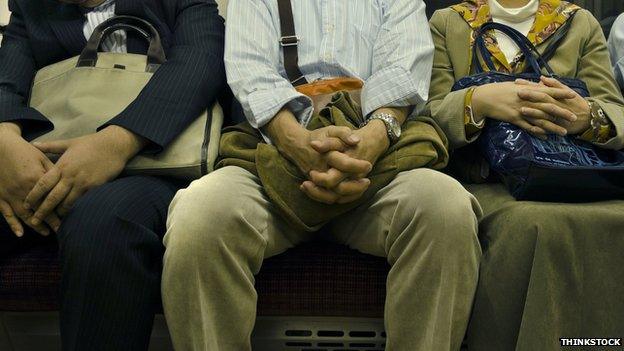'Manspreading' added to online dictionary
- Published

'Manspreading' is a common sight on public transport
The act of "manspreading", or sitting with legs wide apart on public transport, is among 1,000 new words to enter the online Oxford dictionary.
issues quarterly updates on current definitions of English words.
Other new entries include Grexit, Brexit, hangry, beer and wine o'clock and NBD - meaning "no big deal".
Oxford Dictionaries said the addition of multiple slang words showed "creative" use of language.
New words and phrases are added to the website once editors have enough independent evidence to be confident of their widespread currency in English.
However, they do not gain an entry into the Oxford English Dictionary unless there is a demonstration of continued historical use.
According to Oxford Dictionary's language monitoring service, hangry has seen its usage increase since 2012, with a spike in April 2014 connected to an American study about low glucose levels making people cross.
New online dictionary entries
Manspreading - when a man sits with his legs wide apart on public transport encroaching on other seats
Bants - short for banter
NBD - abbreviation of no big deal
Hangry - adjective used to show feelings of anger or irritability as a result of hunger
Grexit and Brexit - the potential departure of the UK and Greece from the EU
Awesomesauce - to describe something as excellent
Weak sauce - anything of a poor or disappointing standard
Bruh - describing a male friend
Pocket dial - to accidentally call someone while your phone is in a pocket
Mkay - the informal pronunciation of OK
Fiona McPherson, senior editor of Oxford Dictionaries, said the addition of multiple slang words did not represent a dumbing down of English.
She said: "There's always been new slang words. I just think we are more aware of them because of the ways in which we consume and live our lives now.
"We are bombarded with more and more avenues where those sort of words are used and we just think that there are more of them. I don't necessarily think that's the case."
- Published14 August 2014
- Published10 June 2014
- Published19 November 2013